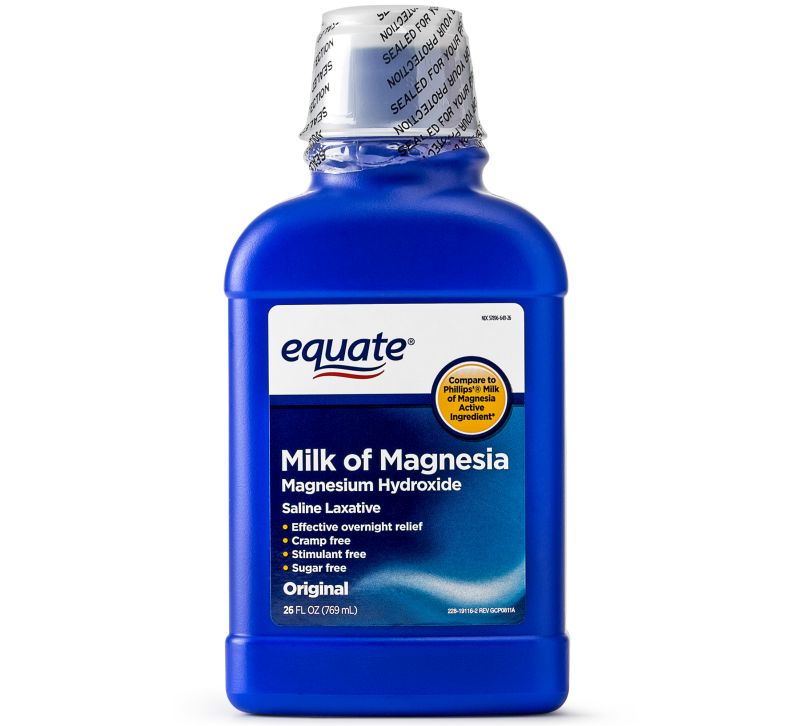Is your best buddy having tummy troubles? Milk of magnesia is an over-the-counter antacid primarily intended for human use. However, it is generally safe for dogs when administered properly and with your vet’s approval.
Below, we’ll explain everything you need to know about this medication, the proper dosage in dogs, and some of the things it treats. We’ll also share a couple of alternatives to milk of magnesia so that you can select the right solution for Spot.
Milk of Magnesia for Dogs: Key Takeaways
- Milk of magnesia is a medication used to treat a variety of digestive problems. It is primarily used by humans, but veterinarians may also recommend using it to treat dogs suffering from things like constipation or acid reflux.
- Though you should always check with your vet before administering any medication to your pet, milk of magnesia is generally considered safe for dogs. It is, however, important to select a non-flavored version of the product and to administer it in the correct dosage.
- There are a number of alternatives to milk of magnesia, which treat some of the same symptoms. For example, pumpkin puree can be used to treat diarrhea, while probiotics may be helpful for addressing constipation.
What is Milk of Magnesia?

Milk of magnesia is an over the counter medication used to treat occasional constipation, gastric reflux, or indigestion. This laxative and antacid works by reducing the amount of acid in your dog’s stomach and drawing water into the intestines to help with the flow of digestion.
Milk of magnesia’s only active ingredient is magnesium hydroxide, which isn’t harmful to animals when administered in veterinarian-approved dosages.
That being said, prolonged use of the medication can lead to overdependence on laxatives, ongoing constipation, irregular bowel movements, and mineral imbalances.
This means you’ll only want to use this medication occasionally, and per your vet’s instructions. Thankfully, the medication causes few to no side effects for most dogs, so your canine companion should be able to alleviate his stomach upset without issue.
What Conditions Does Milk of Magnesia Treat in Dogs?

It’s always a good idea to see your vet if you notice your dog having regular bowel or stomach-related issues. That being said, Milk of magnesia can help soothe a number of digestive-related issues in the meantime including:
- Tough stools
- Digestive upset
- Acid reflux
- Constipation
- Bleeding from anus
- Irregular bowel movements
- Scooting
- Discolored stool
- Itching around anus
- Excessive flatulence
Do you need some veterinary advice?
You may want to consider enrolling in Pawp — for only $24 per month, you can access to Pawp’s nationwide network of licensed veterinarians and jump on a video-call with a vet (or communicate via text, if you prefer).
These consultations are unlimited, and you’ll have access to the vets 24 hours a day, 7 days a week!
So go ahead, sign up with Pawp and talk one-on-one with a vet about your pup’s problems, all from the comfort of your home.
Not sure if Pawp is right for you? You can try the program out risk-free with a FREE 7-day trial!
Is Milk of Magnesia Safe for Dogs?
Unflavored milk of magnesia is safe for dogs so long as you have your vet’s blessing and follow proper dosage instructions.
While most dogs tolerate milk of magnesia without issue, the laxative can interact with other medications, so you’ll want to give your vet a call before administration.
Note that there are different flavors of milk of magnesia intended for humans. Your dog should NOT have milk of magnesia with added flavor, as some of these formulations may contain xylitol and other harmful ingredients.
You can also find veterinary formulations of milk of magnesia, though these products have the same ingredients as the unflavored human versions of the product.
If your dog has an adverse reaction to milk of magnesia, you’ll need to discontinue use and set up an appointment with your veterinarian for further evaluation.

What Is the Proper Milk of Magnesia Dosage for Dogs?
Milk of magnesia should be dosed according to your veterinarian’s instructions, so be sure to give him or her a call before providing your pooch with the goods. This is especially important if your dog is on any other medications, as milk of magnesia can interact negatively with other substances.
That said, generally speaking, dogs can have 1 to 2 teaspoons of milk of magnesia every 4 to 6 hours when used as an antacid.
If you’re using it as a laxative, the medication can be administered in a 1 to 3 tablespoon dose once a day.
If you notice that your dog is responding poorly to the medication or that his symptoms are persisting, it’s time to go in for a formal appointment with your veterinarian.
Alternatives to Milk of Magnesia in Dogs

There are other ways to alleviate your dog’s symptoms outside of milk of magnesia depending on what your dog is experiencing. Here are some other solutions to consider with your veterinarian:
- Pumpkin for constipation or diarrhea: Pumpkin is a safe and nutritious food most dogs consider as a treat. Canned pumpkin puree (not pumpkin pie filling) is full of fiber and can be mixed in with your dog’s dinner or just given as a “treat” to help with tummy troubles. Start with a tablespoon of pumpkin puree and see how your four-footer responds over the next 24 hours.
- A fiber-rich diet for scooting: High-fiber dog food can help dogs with anal gland issues, which may be leading them to perform the infamous butt-scoot across your carpet. Fiber can help bulk up your dog’s stools, making it easier for anal gland to empty themselves, alleviating your dog’s need to scoot around the house.
- A diet change to cut back on Fido’s flatulence: It’s not uncommon for dogs to have occasional gas. That being said, if your furry friend is frequently passing bad gas, it may be a sign that it’s time to make a diet change under the direction of your veterinarian. Don’t forget to inspect your dog’s daily treats, too.
- A bland diet for stomach upset or diarrhea: Oftentimes, your vet may recommend that your pooch has a “bland diet” of food he can easily digest to get his system back in order after a bout of canine diarrhea. This usually includes a combination of something like white rice and boiled chicken, but your veterinarian can provide feeding instructions personalized for your pooch’s needs.
- Probiotics for GI upset and gas: Your pooch’s tummy troubles may be eased with the help of probiotics –commercially produced versions of beneficial bacteria. These over the counter supplements can be purchased without a prescription, but you should still speak with your veterinarian to make sure it’s a good choice for your canine companion.
- A trip to the vet with discolored stools. A slight discoloration of your dog’s stool could be fairly benign, continued discoloration can point to a more serious underlying issue. You’ll need to get in touch with your veterinarian if your dog’s stools are consistently anything but the safe brown color. When in doubt, get your pooch checked out.
***
Milk of magnesia can make an excellent tool for alleviating your dog’s digestive issues. Just make sure you’re administering the proper dose for your furry friend under the direction of your veterinarian.
Does your dog use milk of magnesia? What does it help your pooch with? We’d love to hear about it in the comments!








No Comments